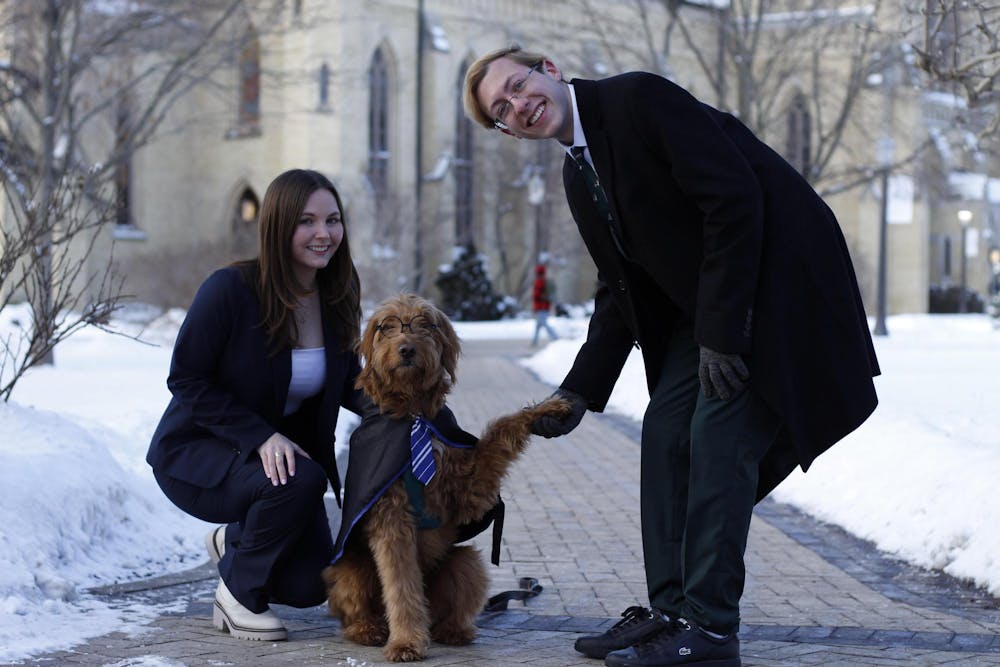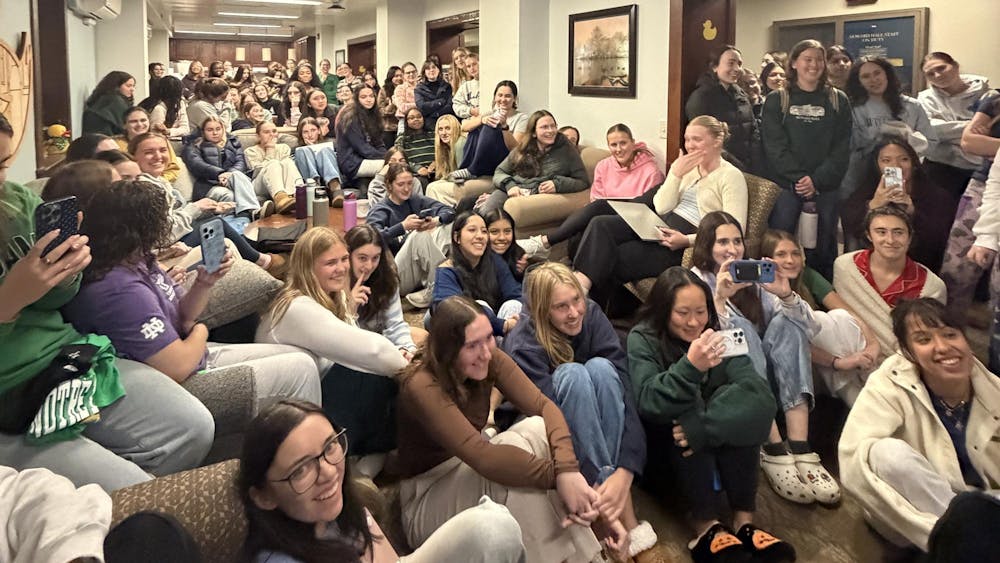Despite their involvement on campus, student body presidential candidate James Baird and vice presidential candidate Abbie Toth never expected to end up at Notre Dame. Regardless, a love for the University snuck up on them and morphed into a shared motivation to become student body president and vice president.
“I had no family who went here. I actually grew up with kind of anti-Notre Dame ties,” Toth said, explaining that her father is a USC fan and her sister a graduate of Boston College.
Baird, once a public high school student from Florida, did not see the University’s campus until move-in day.
“We love Notre Dame,” he said. “It’s kind of ironic because I knew nothing about this place before I got in here.”
Lack of familiarity did not stop Baird or Toth from taking on leadership roles in their residence halls and in academic settings.
Baird, a junior studying history and political science with a minor in constitutional studies, serves as president of Alumni Hall and is a former senator for the dorm. He co-leads a Student Policy Network project that works toward sanctioning those involved in human rights abuses. He is also a developing researcher through the Kellogg Institute for International Studies, where his research interests include U.S. political history, democratic backsliding and international law.
Toth, also a junior, is from Pasadena, California, majoring in finance and economics with a minor in real estate. She was the vice president of Pasquerilla East Hall and has led two nonprofit consulting projects for the Student International Business Council (SIBC). Atop numerous consulting projects, Toth is also a tour guide for the University.
Baird and Toth say they have found their “home under the Dome.” Now, they say they want to help other students find that too, especially those who might not feel a sense of welcome.
“We want the school to be a place that is truly home for everyone,” Toth said.
Another shared motivation for the ticket is a desire to please students.
“It makes us happy to try and make other people happy,” Baird said. “That’s kind of the goal in my life.”
The duo have drawn up a 15-page platform to accomplish that goal. Its objectives range from increasing flex points and draining sidewalks to bringing the President of the United States to speak for the 2025 Commencement and canceling classes in honor of Labor Day.
One of their most ambitious goals is to place a student on the Board of Trustees. The student trustee will be responsible for reporting back to the student body about the conversations and decisions made by the Board.
“I’ll admit, it’s going to be a very difficult thing to do,” Baird said. He then quoted former President John F. Kennedy, saying “We don’t do things ‘because they are easy,’ right? ‘We do them because they’re hard.’”
Baird said other universities, including Stanford, Duke, Indiana, Florida and Purdue, have made progress toward placing a student voice on the board. He added that he has already spoken with vice president for student affairs Fr. Gerry Olinger about the policy idea.
“If we were to win, we would be able to make a convincing argument,” Baird said. “Not only do we have a number of peer institutions, but it would be beneficial to the Board of Trustees and the University itself.”
With plans for big changes, Baird and Toth acknowledge the difficulties of getting things done and identify a problem of apathy toward student government.
“A lot of people might not care about student government,” Baird said. “There’s a lot of cynicism. We want to show people, again, that student government can be a force for good.”
To help move the needle on cynicism, Baird wants to increase communication by reviving regular Instagram videos and Spotify podcasts. He mentioned bringing former student government leaders back to campus to film a video about their accomplishments. The Baird-Toth platform also emphasizes the importance of hosting various town halls and Student Life Council events in which students can speak directly to administrators.
Baird-Toth also have ideas for improving campus dining: numbering the tables to help students find their friends, bringing back trays, inviting South Bend restaurants to serve their food at the dining halls and implementing take-out containers for sale, a practice already in place at Saint Mary’s College. They also want to create the “Hesburger,” a new signature dish and bring back the tradition of “Circus Lunch.”
The pair also want to improve transparency and accessibility by creating student surveys and publishing monthly expenditure reports.
Other goals relate to student health and wellness, spiritual life, sustainability, race and ethnicity recommendations, improving student safety — including on Indiana State Road 933 between Notre Dame and Saint Mary’s — technological improvements like Venmo in dorms and Mobile IDs, civic engagement efforts, accessibility on campus, student exploration of South Bend and equity for students from all walks of life. Baird-Toth also detailed goals to improve the lives of students from first-generation, low-income backgrounds, LGBTQ+ students and international students.
Given such a wide range of ideas, Baird has already thought about how he and Toth will accomplish the lengthy list, even if University administrators are not initially on board. In his time as president of Alumni Hall, Baird says he has learned how to move past a “no” by coming up with more ways to persuade.
“What I’ve found is just the art of going back again and again and again,” he said.
Students will have three choices for this year’s student body election. Baird and Toth hope to win the vote by chasing after ambitious but feasible goals that cater to every student.
“We feel like we can reach a large audience of campus in a way that’s relatable and reasonable,” Toth said. “We’re saying let’s do these initiatives that are feasible, real. Maybe they’re difficult, but we believe that they can be done and actually have a good impact on the student body.”










